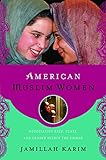American Muslim Women : Negotiating Race, Class, and Gender within the Ummah / Jamillah Karim.
Material type: TextSeries: Religion, Race, and Ethnicity ; 10Publisher: New York, NY : New York University Press, [2008]Copyright date: ©2008Description: 1 online resourceContent type:
TextSeries: Religion, Race, and Ethnicity ; 10Publisher: New York, NY : New York University Press, [2008]Copyright date: ©2008Description: 1 online resourceContent type: - 9780814748091
- 9780814749111
- African American women -- Religious life
- Muslim women -- United States -- Social conditions
- Muslims -- United States -- Social conditions -- Case studies
- Sex role -- United States -- Case studies
- Social classes -- United States -- Case studies
- South Asian American women -- Religious life
- Women immigrants -- United States -- Social conditions
- RELIGION / Islam / General
- African
- American
- Asian
- Atlanta
- Chicago
- Islamic
- Muslims
- South
- This
- challenged
- class
- create
- equality
- ethnographic
- explores
- harmony
- hopeful
- ideals
- immigrant
- inequalities
- possibilities
- race
- racial
- remains
- society
- study
- that
- 305.6/97 22
- E184.M88 K37 2009eb
- online - DeGruyter
| Item type | Current library | Call number | URL | Status | Notes | Barcode | |
|---|---|---|---|---|---|---|---|
 eBook
eBook
|
Biblioteca "Angelicum" Pont. Univ. S.Tommaso d'Aquino Nuvola online | online - DeGruyter (Browse shelf(Opens below)) | Online access | Not for loan (Accesso limitato) | Accesso per gli utenti autorizzati / Access for authorized users | (dgr)9780814749111 |
restricted access online access with authorization star
http://purl.org/coar/access_right/c_16ec
African American Muslims and South Asian Muslim immigrants are two of the largest ethnic Muslim groups in the U.S. Yet there are few sites in which African Americans and South Asian immigrants come together, and South Asians are often held up as a "model minority" against African Americans. However, the American ummah, or American Muslim community, stands as a unique site for interethnic solidarity in a time of increased tensions between native-born Americans and immigrants.This ethnographic study of African American and South Asian immigrant Muslims in Chicago and Atlanta explores how Islamic ideals of racial harmony and equality create hopeful possibilities in an American society that remains challenged by race and class inequalities. The volume focuses on women who, due to gender inequalities, are sometimes more likely to move outside of their ethnic Muslim spaces and interact with other Muslim ethnic groups in search of gender justice.American Muslim Women explores the relationships and sometimes alliances between African Americans and South Asian immigrants, drawing on interviews with a diverse group of women from these two communities. Karim investigates what it means to negotiate religious sisterhood against America's race and class hierarchies, and how those in the American Muslim community both construct and cross ethnic boundaries.American Muslim Women reveals the ways in which multiple forms of identity frame the American Muslim experience, in some moments reinforcing ethnic boundaries, and at other times, resisting them.
Mode of access: Internet via World Wide Web.
In English.
Description based on online resource; title from PDF title page (publisher's Web site, viewed 01. Nov 2023)


